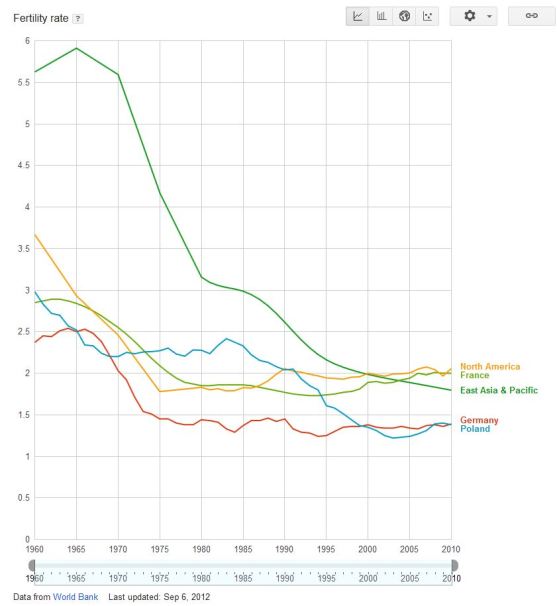Not much needs to be said about the demographic evolution of the developed countries. Basically, in order to have a stable population that maintains itself over time, fertility rates (the number of children each woman has in average throughout her lifetime) need to be slightly above 2 (applicable only for the developed countries). For values below 2, the population is contracting over time, eventually disappearing altogether. For values above 2, the population is expanding, putting pressure on the environment. Right now, these fertility rates are around 1.25- 1.5 (source) in most developed countries.
These fertility rates are not country specific, but rather group specific. For instance in the US, the white population has a fertility rate of 1.8, while the black population has a fertility rate of 2.0 and the Hispanic population a fertility rate of 2.4. (source) In other words, the low fertility rates are a characteristic of White populations (and also Asian).
Taking the case of the US into consideration, this means that over time, the white population will eventually mix and disappear into other groups; groups that will become the dominant ones within society.
But this is only half of the story, another interesting evolution is that immigrants tend to make a lot of kids (above 3), when they arrive in a developed country. However, their offspring tend to make significantly less kids. By the time these immigrants reach the third generation, they usually have fertility rates well below 2.5. Also, in the past decades, other less developed countries had witnessed sharp declines in their fertility rates, most likely due to much better means for contraception (source).
So what is happening?
Simple, people now have access to efficient means of birth control and they do just that, control the number of kids they want to have, the moment they want to have them and with whom they want to have them.
The problem?
The problem is that until now, nature sort of tricked us until into having kids. We loved each other, had sex, and as a wanted or unwanted consequence, sometimes this led to pregnancy and eventually childbirth. This is not a very happy situation for many people, since having kids requires responsibility and financial sacrifices: one must give up on a part of himself/herself for the benefit of his/hers children. Today many people don’t feel ready for this until they feel they achieved financial stability. In previous times, without birth control, the entire institution of marriage emerged. Its purpose was to regulate the way people of opposite sex enter into relationships so that unwanted pregnancies are avoided and children have some guarantee that someone will take care of them.
Our modern society allows us to decide very much on the whole child-making issue, we are no longer at the hands of nature or stigmatised if we have kids outside marriage, we can pretty much do what we want. Unfortunately, in a highly individualistic society, where the most cherished achievement is individual self-realisation, the result is predicable: kids fall on the second place.
Why a problem?
This is a problem because the above behaviour leads to extinction.
Let’s take the case of Japan with fertility rates of 1.39. Assuming all kids survive into adulthood (which never happens), then the population of Japan of 127.8 million will be reduced to 20 million in about 400 years and to 3 million in 800 years from now. To some this sounds like a lot, but in real, historical terms, this is a very short time, for instance the Roman Empire lasted for about 500 years.
If our behaviour leads to our own extinction, then one must conclude that current social values and behaviours (especially in the developed countries) are at odds with some fundamental biological characteristics of human nature and for that matter, of any other living organism. This is a matter of further debate and research, but it is without doubt an issue that requires further investigation.
P.S. A friend of mine once told me that he doesn’t care much about kids, because what he really wants to do, is to become a great writer and have his books read by many people. I asked him: “If you are not interested in kids, then who will be left to read your books after you are dead?”
